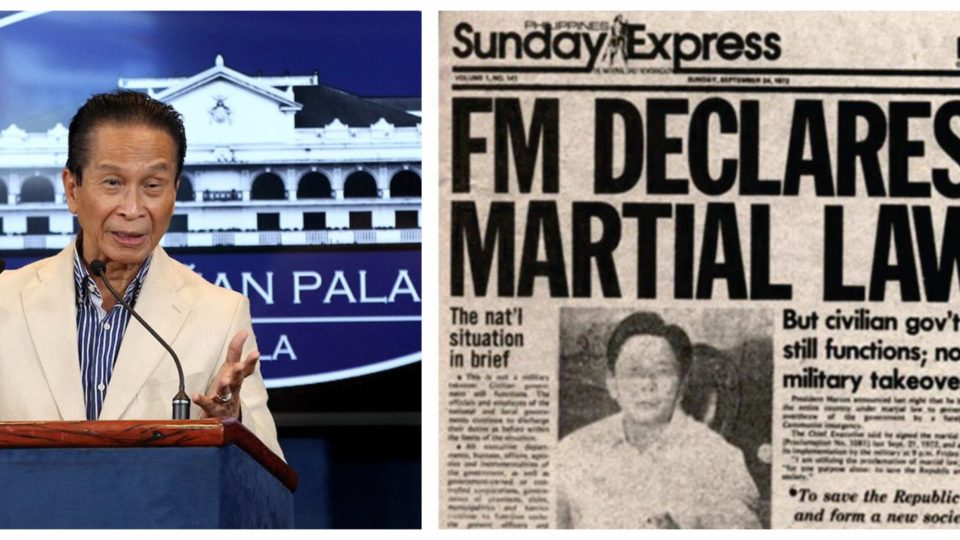Ferdinand Marcos’ martial law years may have been known for its numerous human rights violations, but it was a “necessity,” the Malacañang Palace said in an official statement released yesterday, a day after the Philippines celebrated the 47th anniversary of its declaration.
Presidential spokesperson Salvador Panelo, in his statement, categorically declared what his office perceived to be the benefits of martial law while acknowledging the horrors it inflicted.
“The imposition of martial law and the abuses it spawned even as it instilled discipline among the citizenry at its inception, as well as reaping success in dismantling the then spreading communist insurgency in the country, created a deep wound to an entire generation,” he said.
He added, “Despite the fears and the trauma it created following its declaration, the framers of the 1987 Constitution acknowledged the necessity of its use to save the Republic from ruin against the enemies of the state, deeming it wise to vest it once more with the President albeit diminishing its discretionary use by adding more safeguards for its abuse.”
It bears repeating that Marcos’ martial law years marked a decade of massive human rights violations, including widespread torture, disappearances, and killings. It also crippled the economy, as underemployment spiked and the country amassed large foreign debt.
Despite of it, President Rodrigo Duterte, a vocal Marcos ally, has praised the late dictator on countless occasions, calling Marcos a most enterprising president, and that his imposition of martial law was “very good.” Duterte even declared the late dictator’s birthday a special non-working holiday in Marcos’ hometown of Ilocos Norte.
On Saturday, prior to Panelo’s statement, social media had a head start of flooding the Internet with their own personal statements about martial law. Some recognized it as a dark point in the Philippines’ history such as @NotGrammarNazi who said, “for those people saying that the country was peaceful during #MartialLaw era: There’s an enormous difference between peace and the deafening silence that resulted from people being unable to speak because they are either afraid, silenced, or dead.”
For those people saying that the country was peaceful during #MartialLaw era: There’s an enormous difference between peace and the deafening silence that resulted from people being unable to speak because they are either afraid, silenced, or dead. #NeverAgain #NeverForget
— Mimosa (@NotGrammarNazi) September 21, 2019
@yournamja re-affirmed “Today we commemorate those people who fought for our nation during Martial Law. Let us #NeverForget what martial law did to our countrymen.”
Today we commemorate those people who fought for our nation during Martial Law. Let us #NeverForget what Martial Law did to our countrymen.#NeverAgainToMartialLaw #MartialLaw #NeverAgain https://t.co/zo664qCq4L
— (@_yournamja) September 21, 2019
@jeffcrisostomo tweeted, “To be pro-Marcos is to be anti-justice, anti-accountability, anti-human rights, anti-democracy, and anti-freedom.”
To be pro-Marcos is to be anti-justice, anti-accountability, anti-human rights, anti-democracy, and anti-freedom. #NeverForget #NeverAgain
— Jeff Crisostomo (@jeffcrisostomo) September 21, 2019
But we’d me amiss not to report that there were also tweets that appeared to be for martial law, like this one from @metrobus926 who said, “As long as we’re currently living in a free-for-all, anarchy-like state of mind, this 40-year-old slogan will never get old. Happy Martial Law Day everyone.” (Poster reads: For a country’s progress, discipline is needed.”
As long as we’re currently living in a free-for-all, anarchy-like state of mind, this 40 year-old slogan will never get old.
Happy Martial Law Day Everyone.
#1021#MartialLaw #SaMendiolaLangMagulo
#1972 pic.twitter.com/oks4IvUCOY— M.K.M.S. (@metrobus926) September 21, 2019
Earlier this week, a Philippine state university announced that it will be teaching martial law as a general education module tackling the language, literature, and culture under martial rule in the country. Senator Imee Marcos, the late dictator’s daughter said that it was good to be studied but that her family’s side of the story should be told alongside it.
Read: Imee Marcos cool with uni teaching martial law, but wants family’s ‘side of the story’ told
Where do you stand on the matter? Do you agree that martial law was a “necessity”? Tell us by leaving a comment below or tweeting to @CoconutsManila.




